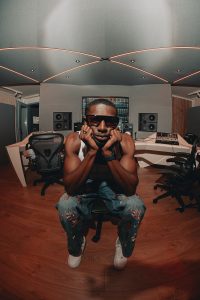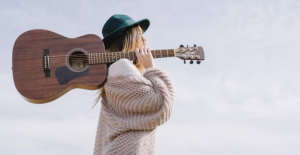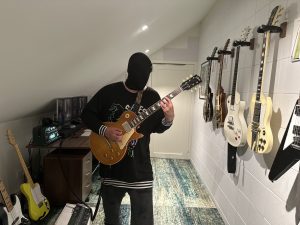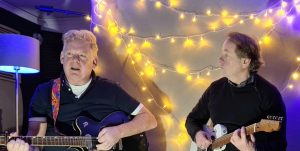Fresh off the back of releasing her debut EP, Naaz, one of Holland’s most effortlessly promising young songwriters, is embarking on the most game-changing leg of her career so far.
Having dropped a number of hit tracks and gorgeous visuals already this year, the Kurdish songstress has been garnering some well-deserved attention. Shimmering instrumentals paired with her silky tones and a vivid combination of melody and mood have seen Naaz flourishing into one of 2018’s most compelling artists.
We spoke to Naaz about self-producing, growing up in a conservative Kurdish household and overcoming the hurdles that come with being a young Middle Eastern woman in the music industry.”I think a lot of the motivation stemmed from fear paired with love.”
Hi Naaz, how are you? How’s 2018 been going for you so far?
Great! The craziest things have happened. So, in Holland we have this thing called the Edison Award which is like our Grammys. I got nominated last year. I wrote a song on the day I got nominated and it was quite emotional. I never thought I was going to win and was just happy to get nominated but we ended up winning two awards. That’s kind of how the year started so it’s been pretty insane. Also, to have my EP out now feels so special. Now that Bits of Naaz is out, I can move forward and create something new again. I want to create something different with every EP or album I put out, so at the moment I’m just discovering new sounds and it’s fun!
Could you tell me a bit about your background and how you were first introduced to music?
My brother is a musician so that’s what introduced me to it initially but due to being from a Kurdish background, he had a really hard time pursuing his dreams of becoming a musician. What I’m doing now is what you’d normally expect someone from our kind of background to do. It’s not just a girl thing but where I come from being a girl does somewhat limit the ability to pursue a career in music. Where I’m from if you don’t work a steady job it’s easy to end up on the streets and music isn’t necessarily a steady thing. Also, being a Kurd, we have a country but it’s not on the map so having people tell you all your life that you don’t have a country gives every Kurd a certain survival instinct. I think a lot of the motivation stemmed from fear paired with love.
What are your parents like now now that they see how things are going for you? Have they eased up a bit?
The thing I really love about all of this is that my parents didn’t just start supporting me the minute things started going well. That’s what people might think – “So, she is doing well now so her parents started supporting her?” No, they started supporting me the minute they realised that I was serious about all this and wasn’t trying to get into the music industry for the wrong reasons. I didn’t want to do it for the fame or the money. There can be so many sucky parts to doing music that prove you have to really love it in order to survive. The music is the purest thing but what comes with it is sometimes not that genuine. Doing lots of interviews and saying the same things but trying not repeat yourself and doing performances and trying to make people happy, but you need to remember it’s not for them. When people ask me if I make music to inspire people I say no, I actually don’t. I make it for me. If you don’t do it for you, you will end up in a wormhole. If one of my songs doesn’t become huge it doesn’t matter because that was never the intention.
When you were growing up, were there a lot of other kids around you doing the same thing?
No, I was alone in this for sure. I don’t remember a lot of my “childhood” childhood because I had this period in my life where I tried to cut everything out because it didn’t make me happy. Instead of dealing with it, I would just cut it out so now there are certain gaps in my memory and I don’t remember some things at all anymore. It’s really weird but all I can really remember is that I went to a school and I was probably one of the only Middle Eastern kids there. You don’t have the same freedoms that all the kids in your class have. People ask what you want to be when you grow up and you’re like I want to be an artist and even the teachers are like but what do you actually want to do as a real job. I think it’s terrible that kids get told that it’s not a real job. I think it’s a shame that kids are being taught this early on, I don’t think every school is like that but that’s what I experienced. There are superstars out there who were once people who no one knew and weren’t famous, so why is it hard for that 6-year-old kid to dream of that. Whitney Houston was once that kid who wanted to be famous, they were all once kids who weren’t famous. That’s also one of the reasons why I eventually wrote the track ‘Up To Something’. I didn’t feel like telling people what I was doing anymore. I didn’t feel like explaining that I wanted to be a musician and I was going to do it whether people liked it or not. That’s the reason I share my story with people. To show others that it is possible to be a musician and I’m still being supported. I still have my family by my side. It’s possible to run away from your family and do whatever you want, I’ve seen many people do that and even tell me to do that. “Just leave – you’re 18 – just do it.” But no, I want the minute I have that success to share it with the people I love and that created me rather than be all by myself.
How did your debut EP, Bits of Naaz, come together? Am I right in thinking that you produced it all yourself?
Yeah, I produced it and then I eventually sent it to friends of mine at Soul Searching to do the sound doctoring. The guy who does it knows how to add that one synth or note that just takes the sound to the next level. It feels really important to not be the only person on a track because you can kind of lose perspective. If someone else lends an extra pair of ears it always brings it to the next level.
So do you play any instruments or is it mainly keyboards?
Yeah, I used to play the ukulele and keys, but my skills were so limited that I started producing. I thought okay, I’m a confident writer but to create the sound I want I have to learn how to produce. I wanted to make sure I could do all this stuff by myself. So, I do compose my songs, but that’s why they’re kind of simple. the songwriting is never simple, but the production is. I love making vocals the main thing.
Does being a producer, singer and songwriter make it easier to create what’s in your head rather than working with multiple people? I would imagine it allows you to skip a lot of steps.
Definitely, I go crazy when I’m in a session and I have to tell them, I need that one sound. Then I have to wait for the producer to find the sound when I already know where it is. When I make music I feel myself becoming like a crazy scientist from the movies. I don’t want anyone disturbing me. If I could lock my door I would, I just need to be in that space. I have to have that crazy mental moment where at one point I love the song and I feel like Kanye West, then half an hour later I think I can’t make music and I suck at everything in life. Half an hour later I am back at the top again. It’s fun to do it in a session but it’s so much more fun to go crazy by yourself. Maybe I just haven’t found the right people to do it with yet.
“I hate romanticising things but sometimes some really sad things can also be kind of beautiful.”
Love and self-acceptance seem to be ongoing themes throughout your EP. Could you elaborate on the thoughts and feelings that went into the record?
Yeah, so I have this little book that I write my thoughts down in almost every day. I really need to have that inspiration before I decide to make a song. It’s like self-confrontation and self-reflection where you can immediately see how you’re feeling. Sometimes when I write things down they can be very, very negative and then I read them and I’m like “damn, that’s so stupid! why would I say that about myself, I suck.” I kind of write these songs as self-therapy – to convince myself that they’re not true. It’s like I’m having a conversation with myself and that’s why my songs can sound like a kind of dialogue. That’s kind of how all of my songs started – dealing with insecurities instead of running away from them.
Listening to the new record, it sounds like there is a juxtaposition between the way the music sounds and the way the lyrics come across. Underneath, you can tell there are some lyrics which are a bit deeper and darker. Is this a contrast you tried to create or did it come naturally?
I am really glad you noticed that. That’s something I actually only really realised this week. I was writing down what each song was about and when I read it back today I thought, “Woah, this is actually all kind of dark.” You know, especially a song like ‘Mess Me Up’. It sounds quite happy but it’s actually a really dark song. With a song like ‘Someday’ – I think about when I was writing that and I was just so sad. It’s like self-therapy, you know. It’s like me not believing in myself trying to believe in myself. ‘As Fun’ too, I’ve never cried as much writing a song. ‘As Fun’ was like the biggest cry ever. I feel like you can listen to my songs when you’re sad or happy but what you get out of it really depends on your mood.
Is there anything that inspires the type of beats you make? I would say your stuff sounds a bit like Mura Masa or Cashmere Cat. Are you inspired by any producers as well as singers?
When ‘Words’ came out people said it sounded a bit like Mura Masa. I hadn’t really listened to his music before but when I did I loved it. Honestly, though, my music is kind of inspired by a lot of cheesy pop songs. The chords are the main thing in my music, not the percussion. I love the chords from pop songs because they make you feel like you’re falling in love. It’s like that feeling of butterflies in your stomach and that’s what I’m always looking for. I realised that when you grow up there is a point where you can’t really feel the butterflies anymore. I tried to fall in love and couldn’t feel the butterflies anymore and it confused me. At first, I thought It was my problem and there was something wrong with me but then I realised it’s part of growing up. There are certain chords and certain combinations of notes that just make me feel the same butterflies as falling in love did and that’s why some songs, especially on this EP, have that feeling to them. I was really looking for those butterflies. I feel so in the moment and euphoric when I perform them live and that’s exactly what I was trying to do, but at the same time, It’s those same butterflies that inspire the darkness. I hate romanticising things but sometimes some really sad things can also be kind of beautiful. I think that’s what’s behind this EP.
So referring back to your background, how do you think your journey into music could inspire other young Middle Eastern women to do the same thing?
I think just the whole fact that I’m doing it, you know? Often people ask me, “what’s your dream?” and I’m like, my dream has already come true. The fact that I’m able to do this without being stopped. Even if I have a side job, there is still the possibility to do music and that’s all I really need. It doesn’t matter if I end up touring the world or not even getting any gigs. It doesn’t even matter if millions of people hear my music or just one. The fact that I can put it out, to me, is already a major accomplishment.
When are we going to see the next Naaz project? Is there stuff coming up? Are there any exciting collaborations in the works?
I think I’m probably going to put something out at the end of this year. I hope so anyway. I have tons of songs and I’m always making new music. Let’s leave it up to the Universe.
Is there anything else we should know about?
Oh! I have a London gig coming up! It’s on 19th July and it’s my first show abroad.
Good luck we think you have a big career in music!






